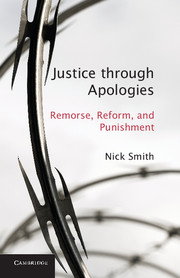Book contents
- Frontmatter
- Contents
- Acknowledgments
- Introduction
- 1 The Categorical Apology Revisited
- Part One The Penitent and the Penitentiary: Apologies in Criminal Law
- Part Two Apologies in Civil Law
- 4 The Institutional Framework: Economic Outcomes and Noneconomic Values
- 5 A Practical Framework for Evaluating Apologies in Civil Contexts
- Concluding Call for Collaboration
- Notes
- Index
4 - The Institutional Framework: Economic Outcomes and Noneconomic Values
Published online by Cambridge University Press: 05 June 2014
- Frontmatter
- Contents
- Acknowledgments
- Introduction
- 1 The Categorical Apology Revisited
- Part One The Penitent and the Penitentiary: Apologies in Criminal Law
- Part Two Apologies in Civil Law
- 4 The Institutional Framework: Economic Outcomes and Noneconomic Values
- 5 A Practical Framework for Evaluating Apologies in Civil Contexts
- Concluding Call for Collaboration
- Notes
- Index
Summary
Introduction
As we transition into apologies in civil law, consider the case of Donna Bailey. The outdoor education instructor and mother of two had been studying to become a physical education teacher when a rollover crash while riding in a Ford Explorer equipped with Bridgestone/Firestone tires left her paralyzed below the neck. This combination of vehicle and tire resulted in an estimated 250 fatal rollover crashes and as many as 3,000 additional serious injuries. Bailey sued for $100 million. Three Ford attorneys visited Bailey at her hospital bed, where she had been confined and breathing through a ventilator for ten months. Ford negotiated to apologize to Bailey and record the hospital visit on video, but only without audio. According to Bailey's attorney, Ford insisted on this silencing condition because “they didn't want anyone hearing what they say.” We do not know why the attorneys sought to limit access to their words, nor do we know what they said to Bailey. Their gestures satisfied Bailey nonetheless. “The gist of the whole thing was that they were truly sorry for what…happened to me,” Bailey recounted, “and I felt like it was very sincere.” Bailey settled for an undisclosed amount that very day. Ford's spokesperson issued a statement: “We are pleased to have resolved this case with Donna Bailey and we extend our sympathies to her and her family.”
- Type
- Chapter
- Information
- Justice through ApologiesRemorse, Reform, and Punishment, pp. 243 - 258Publisher: Cambridge University PressPrint publication year: 2014



